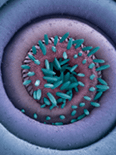
Annual Review of Entomology
Scope & Guideline
Connecting Research, Policy, and Education in Entomology
Introduction
Aims and Scopes
- Insect Biology and Ecology:
The journal publishes extensive research on the biological and ecological aspects of insects, including their life cycles, behaviors, and interactions with their environments. - Pest Management Strategies:
A significant focus is placed on integrated pest management, exploring innovative methodologies and practices for controlling insect pests, especially in agricultural and urban settings. - Chemical Ecology:
Research on chemical interactions among insects, including pheromones and plant-insect interactions, is highlighted, contributing to the understanding of ecological relationships and pest control. - Evolutionary and Developmental Biology:
The journal explores evolutionary processes affecting insects, including adaptation, speciation, and the genetic basis of traits, alongside developmental biology insights. - Conservation and Biodiversity:
Papers addressing the conservation of insect species and their roles in ecosystems are integral to the journal, emphasizing the importance of biodiversity for ecological health. - Urban Entomology:
Emerging themes in urban entomology are explored, focusing on how insects adapt to urban environments and the implications for pest management and public health.
Trending and Emerging
- Urban Entomology:
The rise of urban entomology reflects increasing interest in how insects adapt to urban environments, addressing the unique challenges they pose in pest management and public health. - Insect Responses to Climate Change:
Research exploring how insects respond to climate change, including shifts in distribution and behavior, has gained traction, emphasizing the need for adaptive management strategies. - Microbial Symbiosis:
The investigation of microbial symbionts in insects is increasingly relevant, as studies reveal their roles in nutrition, digestion, and disease resistance, impacting both ecology and pest management. - Insect Resistance Mechanisms:
The exploration of mechanisms behind insect resistance to pesticides and other control methods is emerging as a critical area of research, driven by the need for sustainable pest management. - Impacts of Global Change on Insect Dynamics:
Research focusing on how global changes, such as habitat loss and pollution, affect insect populations and interactions is becoming more prominent, highlighting the importance of ecological resilience.
Declining or Waning
- Historical Entomology:
Research focusing on historical perspectives of insect communities and their interactions has decreased, as contemporary studies prioritize current ecological and management challenges. - Traditional Taxonomy:
The emphasis on traditional taxonomic studies is waning, likely due to the rapid advancements in molecular techniques and genomic approaches that provide more efficient and comprehensive insights. - Non-Ecological Insect Studies:
Research that does not directly address ecological implications or management strategies is becoming less common, as the journal shifts towards studies that provide practical applications for pest management and conservation.
Similar Journals
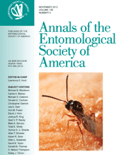
ANNALS OF THE ENTOMOLOGICAL SOCIETY OF AMERICA
Elevating Knowledge in Agricultural and Biological SciencesANNALS OF THE ENTOMOLOGICAL SOCIETY OF AMERICA is a premier journal dedicated to advancing the field of insect science, published by Oxford University Press. With an impressive impact factor and classified in the Q1 quartile for its category, this journal ranks among the top publications in agricultural and biological sciences, specifically within insect science, positioned at #28 out of 181, indicating its significant influence and high-quality research contributions. The journal aims to disseminate original research, comprehensive reviews, and groundbreaking findings that enhance our understanding of entomology, spanning across ecological, evolutionary, and applied segments. With a consistent publication history since 1938, researchers, professionals, and students will benefit from the wealth of knowledge presented in its pages. Although the journal does not currently offer open access, it remains a vital resource for those seeking to stay at the forefront of entomological research and innovation.

Insects is a prominent open-access journal published by MDPI, dedicated to advancing research in the vibrant field of insect science. Since its inception in 2011, this journal has become a vital resource for academics and professionals alike, also ranked in the prestigious Q1 category within the Insect Science field by Scopus, achieving a remarkable rank of 26 out of 181 journals. With an ongoing convergence period from 2010 to 2024, Insects provides comprehensive coverage of various aspects of entomology, including but not limited to ecology, behavior, physiology, and applied entomology. Based in Switzerland, the journal promotes an open-access model, ensuring that vital research is readily available to researchers, practitioners, and students globally. This journal not only facilitates the dissemination of groundbreaking entomological research but also fosters collaboration and interdisciplinary dialogue in the field.
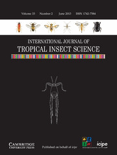
INTERNATIONAL JOURNAL OF TROPICAL INSECT SCIENCE
Innovating Research in Insect Ecology and BehaviorINTERNATIONAL JOURNAL OF TROPICAL INSECT SCIENCE, published by Springer International Publishing AG, is a leading interdisciplinary journal dedicated to advancing knowledge in the fields of insect science and ecology. With its ISSN 1742-7584 and E-ISSN 1742-7592, this journal provides a platform for researchers to publish high-quality, peer-reviewed articles that explore various aspects of tropical insect biology, behavior, and their ecological impacts. As evidenced by its Q3 ranking in both Ecology, Evolution, Behavior and Systematics and Insect Science, it plays a vital role in fostering scientific dialogue and innovation within these disciplines. Researchers affiliated with the journal benefit from its visibility and growing impact, as demonstrated by its Scopus ranks, with a percentile standing of 61st in Insect Science. Although the journal is not open access, it still reaches a wide academic audience, making significant contributions to our understanding of tropical ecosystems. Situated in Switzerland, this journal is crucial for students, professionals, and researchers invested in the intersection of entomology and ecological science.

ACAROLOGIA
Championing the Future of Insect ScienceACAROLOGIA is an esteemed journal published by ACAROLOGIA-UNIVERSITE PAUL VALERY, specializing in the field of Insect Science. With an ISSN of 0044-586X and an e-ISSN of 2107-7207, this journal has been a pivotal resource for researchers and professionals since its inception in 1965. Located in Montpellier, France, it encompasses a broad scope of insect-related studies, contributing valuable insights into fundamental and applied entomology. The journal holds a prestigious position in the academic community, classified in the 2023 Q2 quartile of insect science, demonstrating its influence and relevance in the field. Furthermore, it ranks #86 out of 181 in Scopus’s Agricultural and Biological Sciences category, solidifying its standing among peer publications. Although it does not operate under an open access model, ACAROLOGIA remains a vital platform for disseminating innovative research from 1965 to the present, aspiring to foster a deeper understanding of insect biology and ecology. This journal serves not only as a repository of significant scientific findings but also as a catalyst for future studies and advancements in Insect Science.
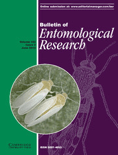
BULLETIN OF ENTOMOLOGICAL RESEARCH
Exploring the Intersections of Insects and InnovationBULLETIN OF ENTOMOLOGICAL RESEARCH, published by Cambridge University Press, is a prestigious journal that has been at the forefront of entomological research since its inception in 1910. With an impressive track record extending through to 2024, this journal serves as a vital platform for advancing knowledge in various related fields, notably Agronomy and Crop Science and Insect Science, where it ranks in the top quartile (Q2) and maintains a commendable position within the Scopus rankings in its categories. Notably, its contributions also intersect with Medicine in a broader scope, fostering interdisciplinary insights. While access to the journal content is not classified as 'Open Access,' its rigorous peer-reviewed articles are crucial for researchers, professionals, and students seeking to enhance their understanding of entomology and its applications in agronomy and beyond. The journal's impact is reflected in its notable percentile rankings, emphasizing its relevance and influence in the academic community. Located at the heart of the UK, the BULLETIN OF ENTOMOLOGICAL RESEARCH continues to be an essential resource for those dedicated to the study and understanding of insects and their impacts on agriculture and health.
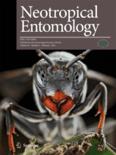
NEOTROPICAL ENTOMOLOGY
Advancing Insect Science in the TropicsNEOTROPICAL ENTOMOLOGY, published by the Entomological Society of Brazil, is a leading journal in the field of Insect Science, recognized for its significant contributions to the understanding of entomological research within the Neotropical region. With an impact factor placing it in the Q2 category and ranked #52 out of 181 in the Scopus rankings for Agricultural and Biological Sciences, this journal provides a vital platform for both seasoned researchers and emerging scholars to publish their innovative findings. Covering a broad scope of topics related to entomology, NEOTROPICAL ENTOMOLOGY aims to highlight the unique biodiversity and ecological significance of insects, fostering further appreciation and study within this crucial area of life sciences. The journal is available in both print (ISSN: 1519-566X) and online (E-ISSN: 1678-8052), ensuring accessibility to a wide audience and enhancing the dissemination of knowledge. As it converges towards its 2024 volume, the journal remains committed to advancing the scientific understanding of insect life in the tropics, making it an essential resource for researchers, professionals, and students alike.
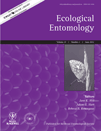
ECOLOGICAL ENTOMOLOGY
Bridging Ecology and Entomology for a Sustainable FutureECOLOGICAL ENTOMOLOGY is a leading peer-reviewed journal published by Wiley, focusing on the dynamic interplay between insects and their environments. With an ISSN of 0307-6946 and an E-ISSN of 1365-2311, this journal has been a pivotal resource in the fields of ecology and insect science since its inception in 1976, and is set to continue until 2024. Recognized for its high academic standards, the journal maintains a prestigious Q1 ranking in both the Ecology and Insect Science categories for 2023, and ranks in the 84th percentile among its peers in agricultural and biological sciences. Although not an Open Access journal, it provides vital insights into ecological processes and insect interactions, making it an essential read for researchers, professionals, and students committed to understanding and conserving biodiversity. The contributions published within its pages significantly advance the knowledge of ecological systems and inform practical approaches to environmental management.
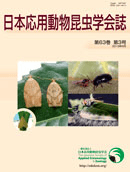
JAPANESE JOURNAL OF APPLIED ENTOMOLOGY AND ZOOLOGY
Unveiling the Secrets of Insect Behavior and EcologyJapanese Journal of Applied Entomology and Zoology is a premier publication in the field of Insect Science, offering a platform for researchers and practitioners to share their findings on applied entomology and zoology. Established in 1957 and published by the Japan Society of Applied Entomology and Zoology, this journal aims to foster the understanding of insect-related studies that impact agriculture, ecology, and biodiversity. With an ISSN of 0021-4914 and E-ISSN of 1347-6068, it serves as a crucial resource for both academics and industry professionals. While the journal currently resides in the Q4 category of the Scopus ranking for Insect Science with a percentile of 11th, it plays a significant role in providing valuable insights into insect behavior, systematics, and their ecological roles. Readers can benefit from its published research to drive innovations and solutions in pest management and conservation practices. As the journal continues to evolve, it reinforces its commitment to disseminating critical research that supports sustainable practices in entomology and zoology through its convergence extending to the year 2024.

REVISTA DE LA SOCIEDAD ENTOMOLOGICA ARGENTINA
Fostering Global Collaboration in Entomological StudiesREVISTA DE LA SOCIEDAD ENTOMOLOGICA ARGENTINA is an esteemed open-access journal dedicated to the field of entomology, published by the SOCIEDAD ENTOMOLOGICA ARGENTINA. Since its transition to open access in 2013, the journal has sought to promote research in insect science, ecology, and related disciplines, facilitating global dissemination of knowledge and encouraging collaborative studies across borders. Located in the vibrant scientific landscape of La Plata, Argentina, the journal is indexed in Scopus and categorized in the fourth quartile of ecology and insect science, reflecting its commitment to enhancing the discourse within these critical fields. Aiming to bridge the gap between researchers, students, and professionals, REVISTA DE LA SOCIEDAD ENTOMOLOGICA ARGENTINA serves as a platform for innovative research, reviews, and reports on ecological interactions, behavior, and systematic entomology, ultimately driving forward our understanding of insect biodiversity and its broader environmental impacts.
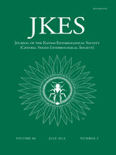
JOURNAL OF THE KANSAS ENTOMOLOGICAL SOCIETY
Connecting Research and Regional Entomological InsightsJOURNAL OF THE KANSAS ENTOMOLOGICAL SOCIETY, published by the Kansas Entomological Society, serves as a vital platform dedicated to the field of entomology and insect science. With an ISSN of 0022-8567 and an E-ISSN of 1937-2353, this journal has established itself since its inception in 1994, continuing to contribute valuable research up to 2024. Despite its current Q4 categorization in the 2023 Insect Science rankings, it ranks 106 out of 181 in Scopus, representing a significant opportunity for researchers to disseminate their findings in a supportive and engaged community. Although it is not an open-access journal, its commitment to rigorous peer review and relevance in agricultural and biological sciences makes it an essential resource for professionals, scholars, and students alike. The journal's focus on local and regional entomological issues often addresses broader ecological impacts, showcasing the importance of insects in environmental health and agriculture. We invite you to explore the rich tapestry of findings and discussions within this esteemed publication.